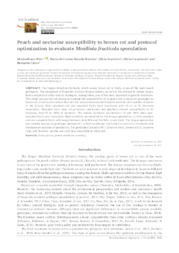Peach and nectarine susceptibility to brown rot and protocol optimization to evaluate Monilinia fructicola sporulation.
Peach and nectarine susceptibility to brown rot and protocol optimization to evaluate Monilinia fructicola sporulation.
Author(s): DINI, M.; RASEIRA, M. do C. B.; SCARIOTTO, S.; CARPENEDO, S.; UENO, B.
Summary: The fungus Monilinia fructicola, which causes brown rot in fruits, is one of the main peach pathogens. The emergence of fungicide-resistant fungus isolates, as well as the attempt to reduce sprays, favors adoption of other control strategies. Among them, one of the most important is genetic resistance. This study was carried out aiming to evaluate the susceptibility of 16 peach and 4 nectarine genotypes to brown rot, as well as to evaluate how well the sporulation area and diameter correlate with number of spores in the lesions. Both wounded and non-wounded fruits were inoculated with 10 ?L of M. fructicola suspension. Wounded fruits from all genotypes (nectarines and peaches) showed susceptibility to M. fructicola, from 92 to 100% of incidence. The disease incidence was between 18 and 100% when nonwounded fruits were inoculated. High variability was detected for the fungus sporulation, in both wounded and non-wounded fruits, with ranges between 16 to 96% and 0 to 94%, respectively. The fungus sporulation was variable among the genotypes (between 0.1 to 96.0 conidia per mm2) and it is positively correlated with the diameter and area of sporulation. The genotypes Conserva 947, Conserva 1662, Conserva 672, Conserva 1600, and 'Bolinha', are the ones with less susceptible to brown rot.
Publication year: 2022
Types of publication: Journal article
Keywords: Prunus Persica
Observation
Some of Embrapa's publications are published as ePub files. To read them, use or download one of the following free software options to your computer or mobile device. Android: Google Play Books; IOS: iBooks; Windows and Linux: Calibre.
Access other publications
Access the Agricultural Research Database (BDPA) to consult Embrapa's full library collection and records.
Visit Embrapa Bookstore to purchase books and other publications sold by Embrapa.

